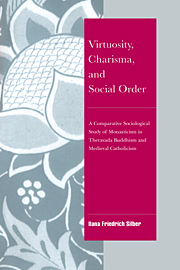 Virtuosity, Charisma and Social Order
Virtuosity, Charisma and Social Order Book contents
- Frontmatter
- Contents
- Preface
- Introduction
- Part I Virtuosi and society: elements of a comparative macrosociological approach
- Part II Virtuosi and society in Theravada Buddhism
- Part III Virtuosi and society in medieval Catholicism
- Part IV Virtuosity, charisma, and social order
- Conclusion: Religious virtuosity as ideological power: some implications for the comparative study of civilizations
- Bibliography
- Index
- Frontmatter
- Contents
- Preface
- Introduction
- Part I Virtuosi and society: elements of a comparative macrosociological approach
- Part II Virtuosi and society in Theravada Buddhism
- Part III Virtuosi and society in medieval Catholicism
- Part IV Virtuosity, charisma, and social order
- Conclusion: Religious virtuosity as ideological power: some implications for the comparative study of civilizations
- Bibliography
- Index
Summary
Writing about the ascetic type, Nietzsche observed: “It must be a necessity of the first order that again and again promotes the growth and prosperity of this life-inimical species. It must indeed be in the interest of life itself that such a self-contradictory type does not die out. … ‘Triumph in the ultimate agony’: the ascetic ideal has always fought under this hyperbolic sign.” It is the “triumph” of the ascetic that will form the main concern of this book.
Although the social bases and implications of religious ideals have been classic topics of sociological debate, one important and closely related theme has not received its due attention: that minority of “virtuosi,” as Max Weber called them, who gear their lives to a superior enactment of religious ideals. I propose to expand upon this neglected strand of Weberian sociology and examine the social position of these religious virtuosi from a comparative and macrosociological perspective. More specifically, I intend to focus on historical settings in which virtuoso elites achieved considerable prestige and ascendancy, or in Nietzsche's apt metaphor, where they attained a paradoxical form of “triumph.”
The inquiry will concentrate on a distinct type of religious virtuosi – hermits and monks – in two civilizations in which they became especially prominent: traditional Theravada Buddhism and medieval Catholicism. At one level, therefore, the present work may be read as a comparative sociological study of monasticism.
- Type
- Chapter
- Information
- Virtuosity, Charisma and Social OrderA Comparative Sociological Study of Monasticism in Theravada Buddhism and Medieval Catholicism, pp. 1 - 22Publisher: Cambridge University PressPrint publication year: 1995
- 2
- Cited by


